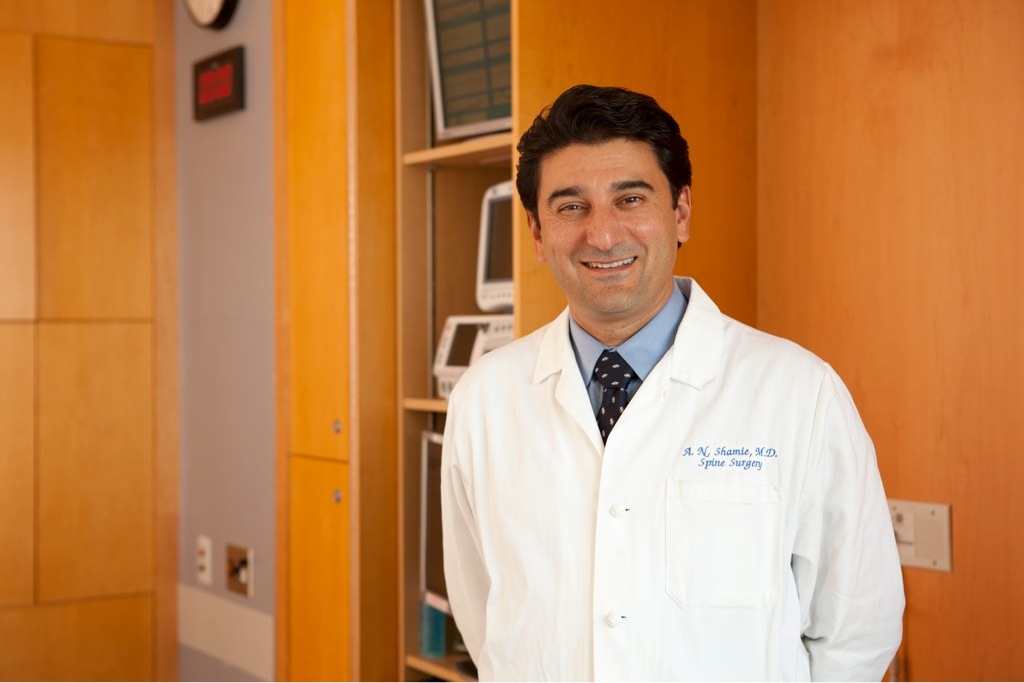 A. Nick Shamie, MD, a spine surgeon with the UCLA Health System, discusses how the sequester and looming budget cuts will impact spine surgeons in the future.
A. Nick Shamie, MD, a spine surgeon with the UCLA Health System, discusses how the sequester and looming budget cuts will impact spine surgeons in the future.
Q: How will the sequester impact spine surgeons and practices?
Dr. Nick Shamie: We don't know exactly what is going to happen in the future because there are some items that are listed as exemptions to the funding cuts, but healthcare has been on the agenda to control the increasing cost and I think it will remain on the sequester list. There is no question we have to curb spending on healthcare in this country. Spine surgery and orthopedic care is expensive for two reasons; one, the implants associated with these surgeries have high costs and two, there are so many Americans affected by these conditions.
The number of individuals needing orthopedic care will increase in the future, so that will impact further expenditure we have on this small section of healthcare. However, orthopedic and spine care is important because it's one of those surgeries that allows our citizens to remain active and working. Usually orthopedic and spine care is rendered during productive years of a person's life. We have to be conscientious about that as we curb costs.
As a society, we need to communicate the importance of orthopedic and spine care to our policy makers. We don't want to hurt productivity in our society and government, so when decreasing costs we don't want to shoot ourselves in the foot by lowering access to quality care.
Q: What should spine surgeons expect as a result of cost pressures from the sequestration? What can they do to meet the challenges from cost cutting?
NS: We will definitely see fewer resources available to provide care for our patients, so how can we adapt to this new environment? I think we need to be leaner, more efficient in care delivery, use less costly resources, consider inpatient versus outpatient care delivery and understand whether surgery is the best option or another form of conservative care.
I think it's counter intuitive to say that surgery is the most cost-efficient option. We always think of surgery as a costly treatment, and we try to avoid it as much as possible, but we have to also consider the overall costs associated with repeated and ineffective nonoperative care; the costs are often more than the one-time cost of surgery and still lead to surgery later down the road.
Q: Are there any big trends or changes in spine care delivery you expect to see as a result of the sequestration?
NS: Since we are focused on curbing costs, one way to achieve lower cost is taking patients into the outpatient surgical environment. I think surgery centers will play a bigger role in spine care going forward. Older patients in our society need orthopedic and spine care, so I think more spine surgeons will be performing their procedures in a surgery center setting because of the cost pressures. Insurance companies and patients will demand we provide care in a more efficient manner and surgery centers are currently less expensive than hospitals.
Q: How will the sequester impact spine technology development? Will it be possible to continue innovating when cost cutting is on everyone's minds?
NS: With the advent of new technology and the ability to provide care to patients with less invasive technologies and techniques, I think we are going to have an increase in effective minimally invasive technologies that can be delivered in a speedy fashion with less morbidity for our patients so we can return them to their work and lives. There will be more pressure for us to provide high quality care.
Naturally, these treatments must be proven with long term efficacy and therefore we will need to look critically at technologies. However, that means it will take longer for us to adopt these technologies and for their cost-effective benefits to enter into the mainstream. We've seen an increased scrutiny on orthopedic and spine devices over the past few years, and the increased criticism could delay some technologies from getting into the mainstream. We want safety proven in new technologies, but time constraints make the process a double-edged sword by increasing the costs of innovation.
Q: Where do you see the biggest changes to the healthcare environment for spine surgeons in the future?
NS: There has been a natural tendency for surgeons to seek shelter from a big organization as a result of these changes. Surgeons are joining big groups, hospitals and accountable care organizations, and I think this trend will continue. In some sectors, I see there will be opportunities for surgeons to provide a higher level of care independent of strict boundaries of an ACO, but in order for that to be successful, there still has to be an affiliation with a big group of surgeons that will allow one to have negotiation power with the payors.
I think the days of independent surgeons in most communities will be limited. I think most surgeons will function more effectively in the group, but there will be some pockets in different regions of the country that will allow independent surgeons to flourish. Those surgeons who maintain their independence — whether in a large group or as an individual — will retain the current model of a private practice physician which will become a rare commodity in our future healthcare systems.
More Articles on Spine Surgery:
Dr. Marc Cohen: 4 Big Coverage Challenges for Spine Surgeons
8 Tips to Develop Spine Surgeon Marketing Strategies With High ROI
5 Steps to Turn Your Spine Program Into a Destination for Treatment

